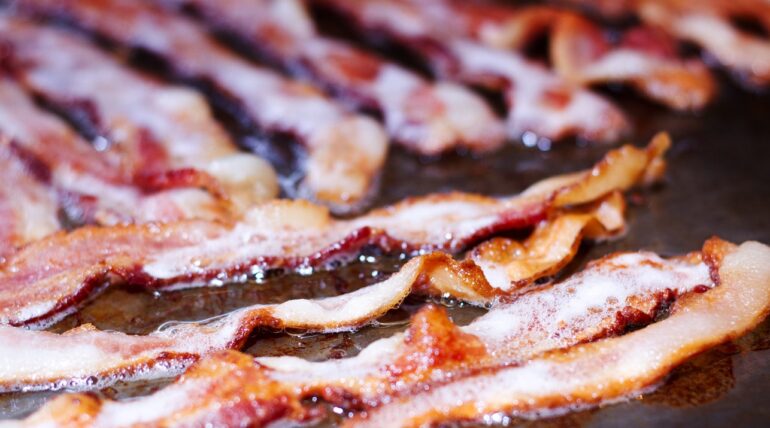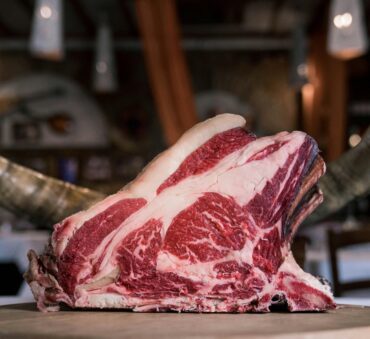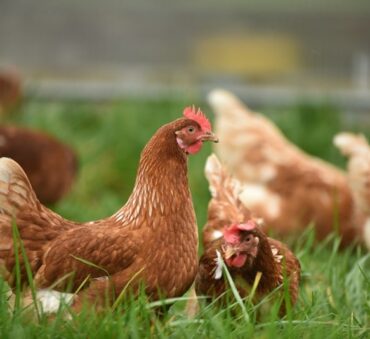Across countless kitchens, people enjoy the sizzling breakfast staple that is bacon, yet few stop to consider the greasy aftermath. What happens to the leftover bacon grease?
While it may seem like a minor, everyday issue, the disposal of bacon grease is a topic that deserves more attention than it often receives. This seemingly trivial act of pouring grease down the sink or tossing it in the trash has serious implications, affecting not just your household plumbing but also the broader environment.
This guide aims to shed light on how to dispose of bacon grease correctly, as well as some practical solutions and creative alternatives to ensure that this common byproduct doesn’t become a common crisis.
Key Takeaways
- Improper disposal of bacon grease can lead to significant environmental issues, including water pollution and harm to aquatic life. The grease can create “dead zones” in waterways, severely affecting biodiversity.
- There are multiple responsible methods for disposing of bacon grease at home, such as refrigeration, freezing, and absorption techniques. These methods are designed to be easy to implement and effective in preventing plumbing issues.
- Local recycling programs and biofuel conversion offer sustainable alternatives for bacon grease disposal. These options not only divert waste from landfills but also contribute to cleaner energy solutions.
- Beyond disposal, bacon grease can be creatively repurposed in cooking, bird feeding, candle making, and even soap manufacturing. These alternative uses provide value in different contexts, from enhancing flavors in cooking to supporting local wildlife.
- Adhering to specific do’s and don’ts ensures responsible bacon grease management, minimizing risks to both household plumbing and the environment. Following these guidelines is crucial for both immediate household maintenance and long-term environmental sustainability.
The Environmental Impact of Bacon Grease
Pouring bacon grease down your sink may seem inconsequential, but it has a broader environmental impact that is often overlooked. When bacon grease is improperly disposed of, it solidifies upon cooling, leading to blockages in both household and municipal plumbing systems. These blockages can result in sewage overflows, which can contaminate local waterways, and the environmental toll of this is significant. Not to mention that it hindrances wastewater sludge treatment efforts.
Polluted waterways adversely affect aquatic life, disrupting their natural habitats and potentially leading to a decrease in biodiversity. This is because when bacon grease enters waterways, it can create a layer on the water’s surface, preventing oxygen from entering the water. This can lead to “dead zones,” areas where aquatic life cannot survive due to low oxygen levels. Fish, plants, and other organisms can suffer, leading to a decline in biodiversity and disrupting the food chain.
Best Methods for Disposing of Bacon Grease
So where do we begin to combat this problem in a way that respects both our plumbing and the planet? It all begins with proper grease disposal. Below, we’ve laid out 3 of the best methods on how to go about this.
The Refrigeration Method
- Let the grease cool slightly: after cooking, give the grease some time to cool down. You don’t want it to solidify in the pan, but it should be cool enough to handle safely.
- Pour it into a container: find an old jar or can—something you’re okay with throwing away. Pour the cooled grease into this container, using a funnel if necessary to prevent spills.
- Store in the refrigerator until solidified: place the container in the refrigerator. In a few hours, the grease will turn into a solid mass, making it easier to dispose of.
- Discard the solidified grease in the trash: Once the grease is solid, you can toss the container into your regular garbage bin. Make sure the lid is tightly sealed to prevent any leaks.
The Freezing Method
- Pour grease into a plastic bag or container: take a sealable plastic bag or another type of container and pour the cooled grease into it.
- Place it in the freezer until solid: put the bag or container in the freezer. This will turn the grease into a solid block, making it easy to handle.
- Discard the frozen block of grease in the trash: once the grease is frozen, you can throw it away in your regular trash. Just like with the refrigeration method, make sure to seal the bag or container securely to prevent leaks.
The Absorption Method
- Material selection: the first step in the absorption method involves choosing an absorbent material that can effectively soak up the grease. Common options include cat litter, sand, or sawdust.
- Mixing and absorption: now, simply mix your selected material with the bacon grease. The goal is to achieve consistency where the grease is fully absorbed, eliminating its liquid state. This makes it easier to handle and minimizes the risk of spills or leaks.
- Disposal of the mixture in the trash: once the mixture is stable and non-leaky, it can be safely disposed of in your regular trash.
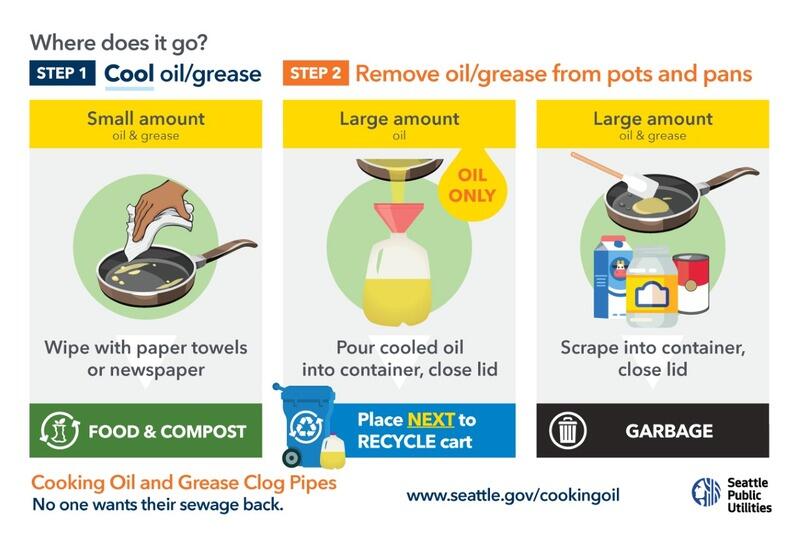
Recycling Bacon Grease
The disposal of bacon grease need not be limited to traditional methods that contribute to waste. There are various ways of recycling grease that not only mitigate environmental impacts but also contribute to resource optimization.
Local Recycling Programs
Certain municipalities have established specialized recycling programs designed to collect and repurpose cooking oils and fats, including bacon grease, to divert such waste from landfills. To find out whether such a program exists in your area, it is advisable to consult directly with your local municipality.
Biofuel Conversion
The conversion of bacon grease to biofuel represents a noteworthy solution. Specialized processing facilities have the capability to transform cooking oils and fats into biofuels, like biogas for example. Biogas generation from food waste serve as a cleaner alternative to traditional fossil fuels. This not only ensures the responsible handling of bacon grease but also actively supports the transition to more sustainable energy sources.
Composting
While less common, the composting of bacon grease is feasible under controlled conditions. It is imperative to note that the inclusion of fats in compost requires specialized knowledge to prevent the attraction of pests and the emission of odors. Therefore, consultation with experts is advised to ensure that you are not doing more harm than good.
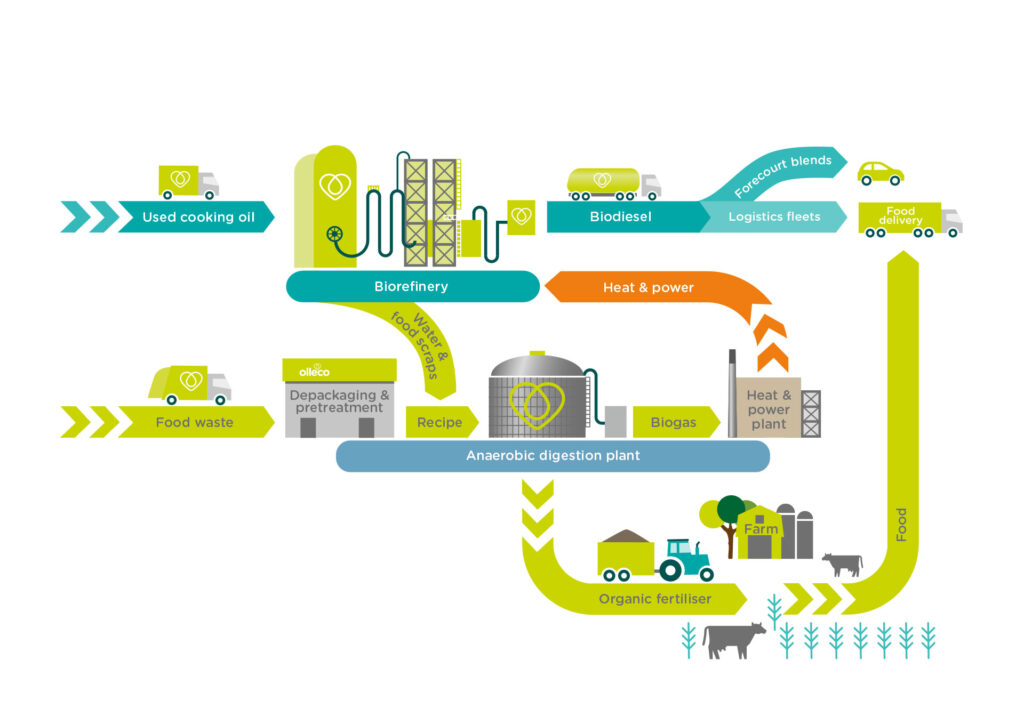
Creative Alternative Uses for Bacon Grease
While the primary focus has been on responsible disposal methods, it is worth noting that bacon grease can also be repurposed in a variety of creative and functional ways. These alternative uses not only minimize waste but also provide value in different contexts.
Flavorful substitute for oils or butter in recipes
Bacon grease possesses a unique flavor profile that can enhance a wide range of dishes. It can serve as a substitute for traditional cooking oils or butter in various recipes, from sautéing vegetables to adding depth to baked goods.
Bird feeder suet cakes
It can also serve as a great way to contribute to local wildlife conservation efforts by making bird feeder suet cakes. These nutrient-dense cakes serve as an essential food source for birds, particularly during colder seasons when natural food supplies are scarce, providing them with the energy they require. We cover other ways of transforming food waste into animal feed in another guide.
Artisanal Candle Making
For those that are more creatively inclined, bacon grease also serves as an effective key ingredient for candles. It often forms a great biodegradable base that burns cleanly, reducing the need for synthetic materials commonly found in commercial candles.
Homemade Soaps
Rich in fatty acids, bacon grease can surprisingly enhance the moisturizing properties of homemade soaps. However, it’s important to note that, due to its unique properties, the use of bacon grease in soap requires a thorough saponification process. This is when the grease is converted into soap through a reaction with an alkali. To ensure safety and efficacy, it’s advisable to consult soap-making guidelines or experts to ensure the correct ratios.
The Do’s and Don’ts of Bacon Grease Disposal
Do
- Cool before handling: Always allow the bacon grease to cool down to a manageable temperature before attempting any form of disposal or storage.
- Use a dedicated container: Opt for a specific, sealable container solely for the purpose of storing and disposing of bacon grease. This minimizes the risk of cross-contamination and simplifies the disposal process.
- Consult local recycling programs: Before you consider throwing away the grease, check if there are any local recycling programs that accept fats and cooking oils disposal.
- Label the container: If you’re storing bacon grease for future use or recycling, clearly label the container. This prevents any accidental misuse and helps others in the household understand its intended purpose.
Don’t
- Dispose of bacon grease in sinks or drains: Pouring bacon grease down sinks, toilets, or outdoor drains contributes to plumbing blockages and environmental pollution. This practice should be strictly avoided.
- Dispose of hot grease in trash bags: Placing hot bacon grease directly into trash bags can lead to leaks and is a potential fire hazard.
- Assume compost compatibility: While bacon grease can be composted under specific conditions, it should not be added to compost piles without proper research or consultation.
- Mix with other household waste: Avoid mixing bacon grease with other types of household waste, especially flammable materials. This can create complications during the disposal process.
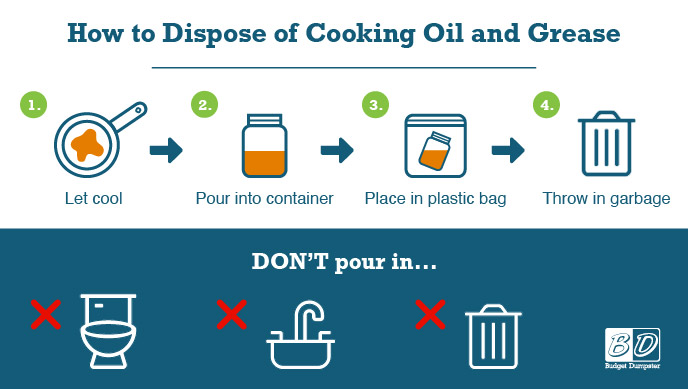
Conclusion
The choices we make in our kitchens have ripple effects that extend far beyond the confines of our homes. Whether it’s the potential for plumbing disasters, the degradation of local ecosystems, or the missed opportunities for recycling and repurposing, the stakes are higher than one might initially perceive.
If you’re in the commercial food industry and are grappling with the complexities of food waste recycling, including bacon grease disposal, we invite you to reach out to us at Shapiro. Our expertise in professional commercial food waste recycling can provide you with sustainable solutions tailored to your business needs. Contact us.
Frequently Asked Questions
No, it is not advisable to pour bacon grease down the drain. Doing so can lead to plumbing blockages in both household and municipal sewer systems. Over time, the grease solidifies and can cause severe clogs, leading to potential sewage overflows and environmental pollution.
Flushing grease down the toilet is equally problematic as pouring it down the drain. The grease can solidify in the plumbing system, causing blockages that may result in sewage backups. This practice is detrimental to both household plumbing and broader wastewater treatment processes.
No, bacon grease should not be put down the garbage disposal. While garbage disposals are efficient for breaking down certain types of food waste, they are not equipped to handle grease. The grease will solidify in the pipes, leading to blockages and potential plumbing issues.
Bacon grease does decompose, but the rate of decomposition is slow and can vary depending on environmental conditions. In a landfill, it can contribute to methane production, a potent greenhouse gas. In composting scenarios, it requires specific conditions to decompose effectively and should not be added to compost piles without proper guidance.
Pouring bacon grease on the ground is not a responsible disposal method. It can attract pests and be harmful to local flora. Additionally, the grease can eventually find its way into waterways, contributing to pollution and negatively impacting aquatic life.
Baily Ramsey, an accomplished marketing specialist, brings a unique blend of anthropological insight and marketing finesse to the digital landscape. Specializing in educational content creation, she creates content for various industries, with a particular interest in environmental initiatives.
